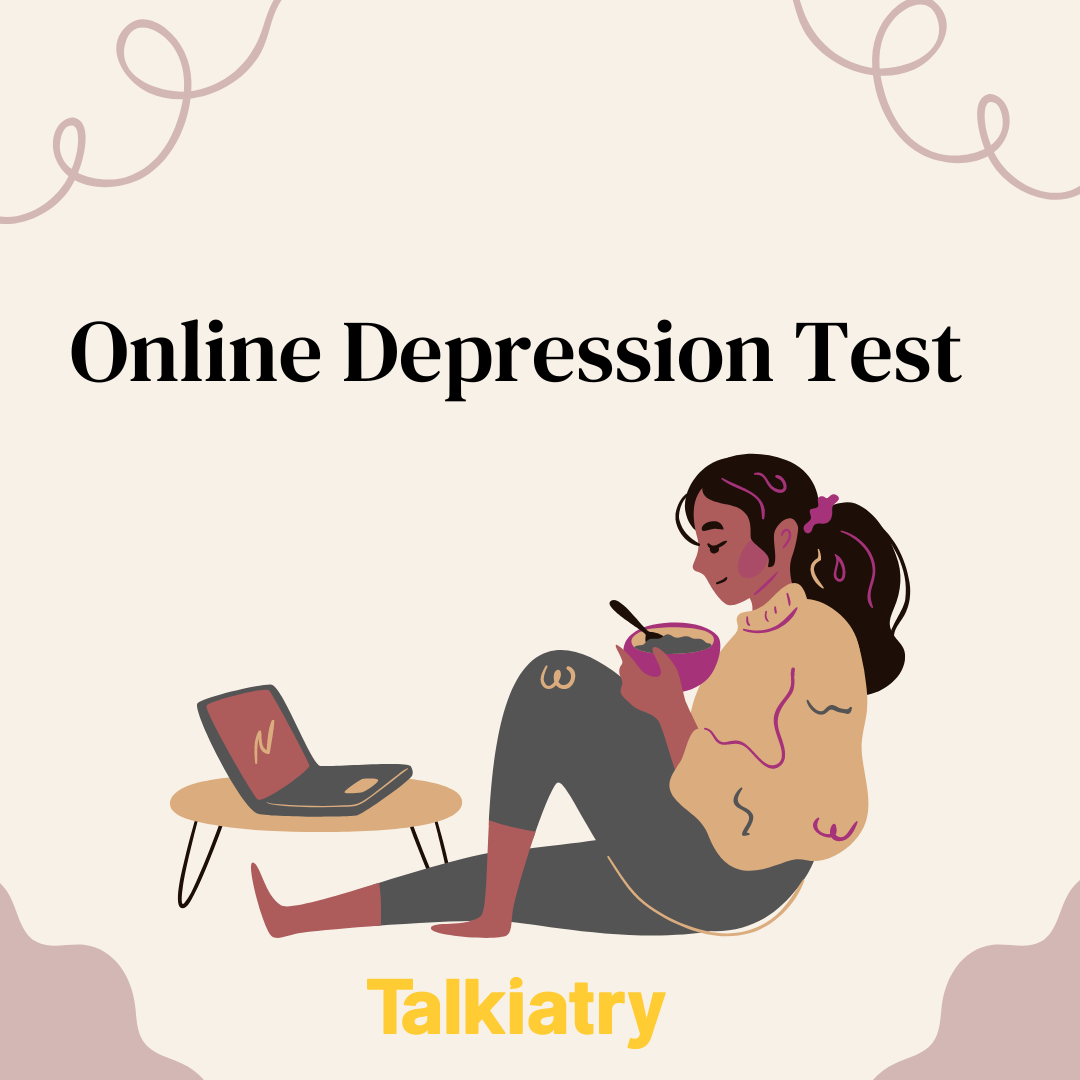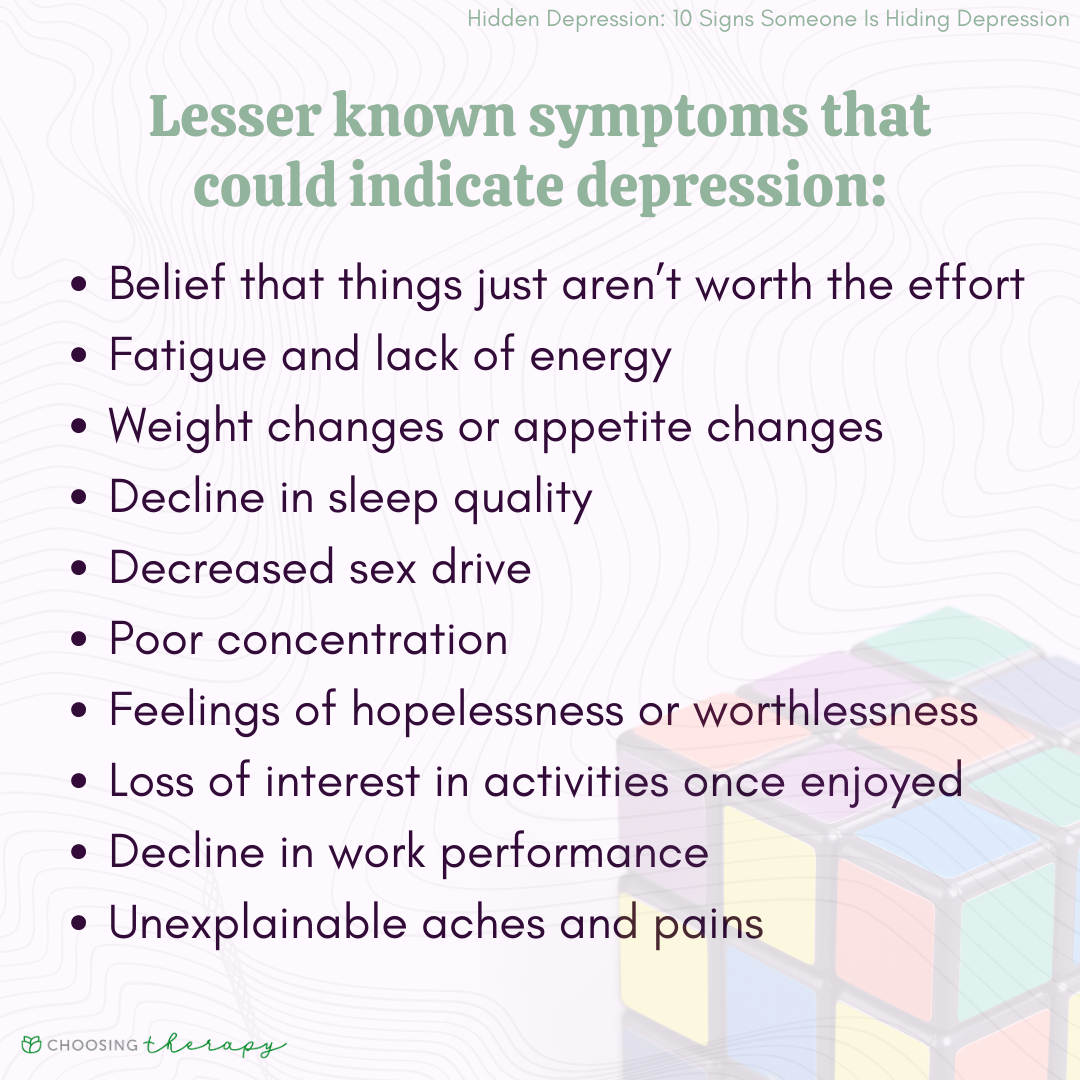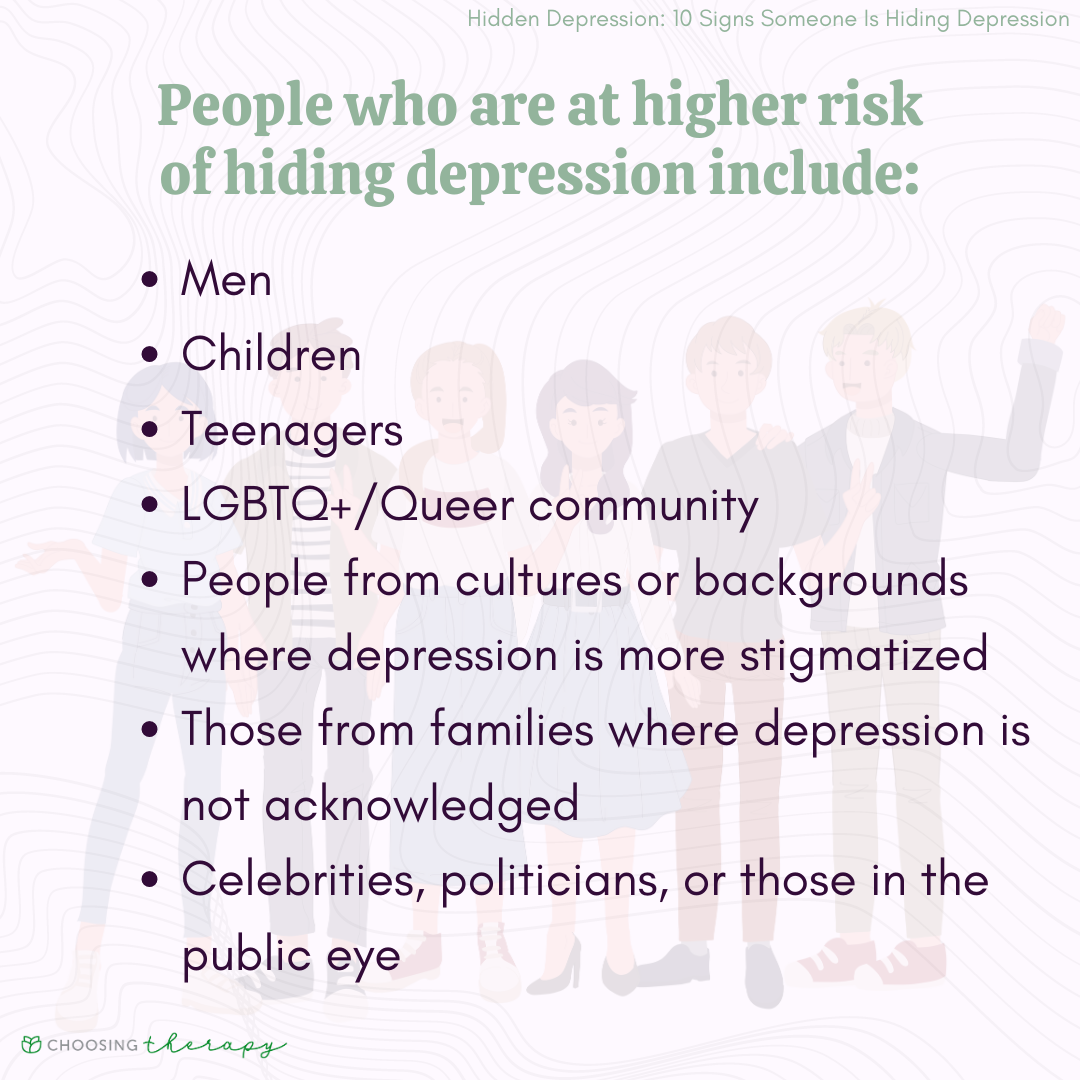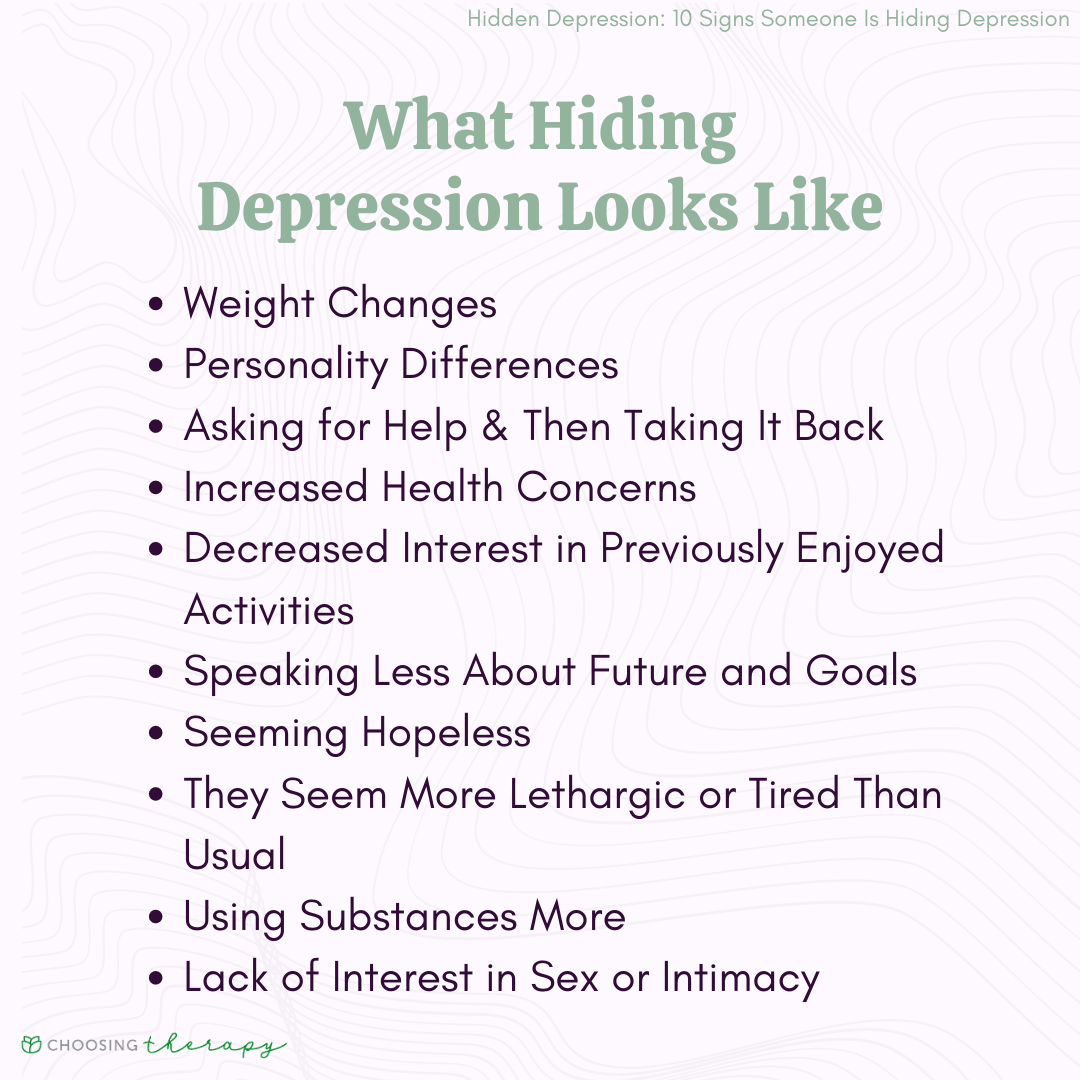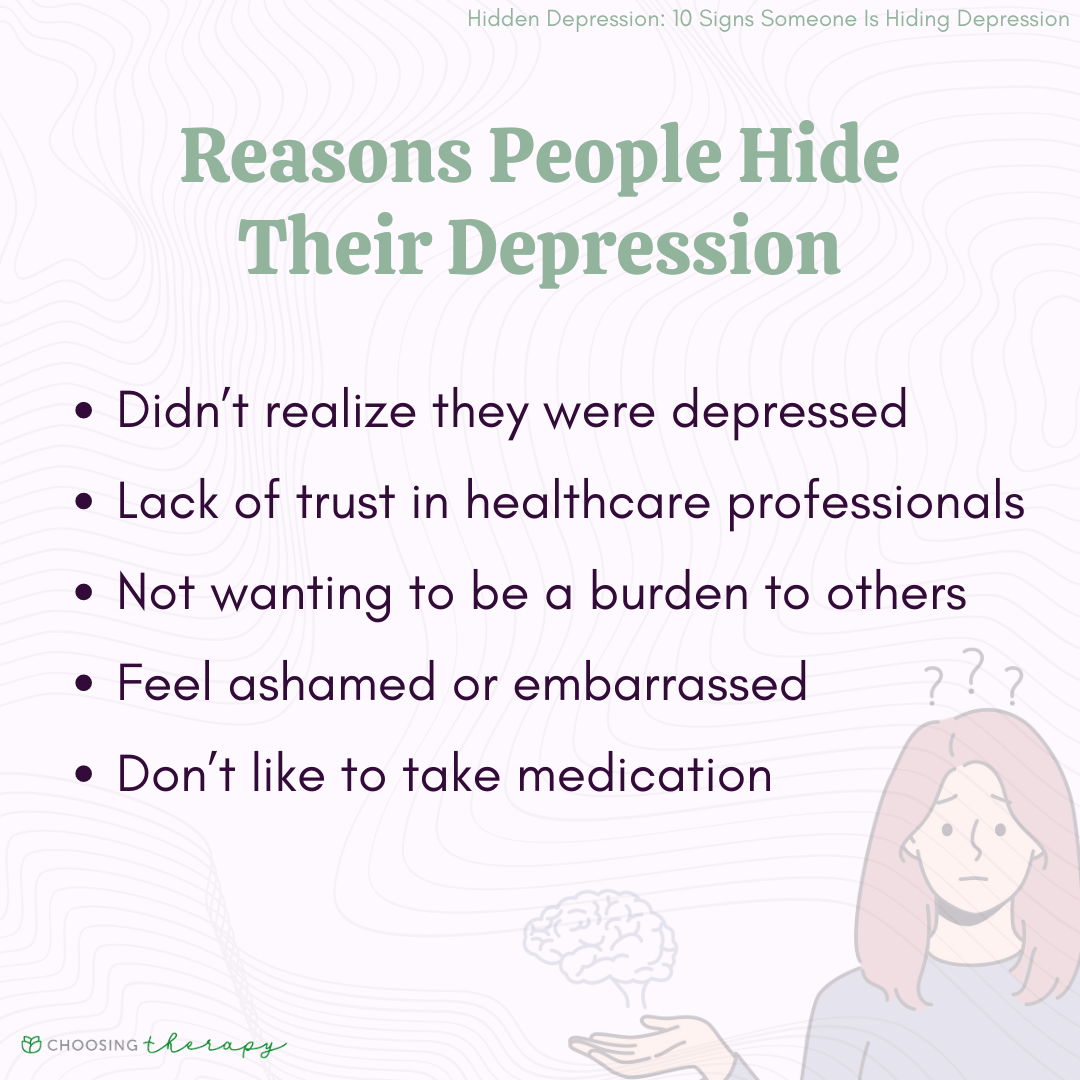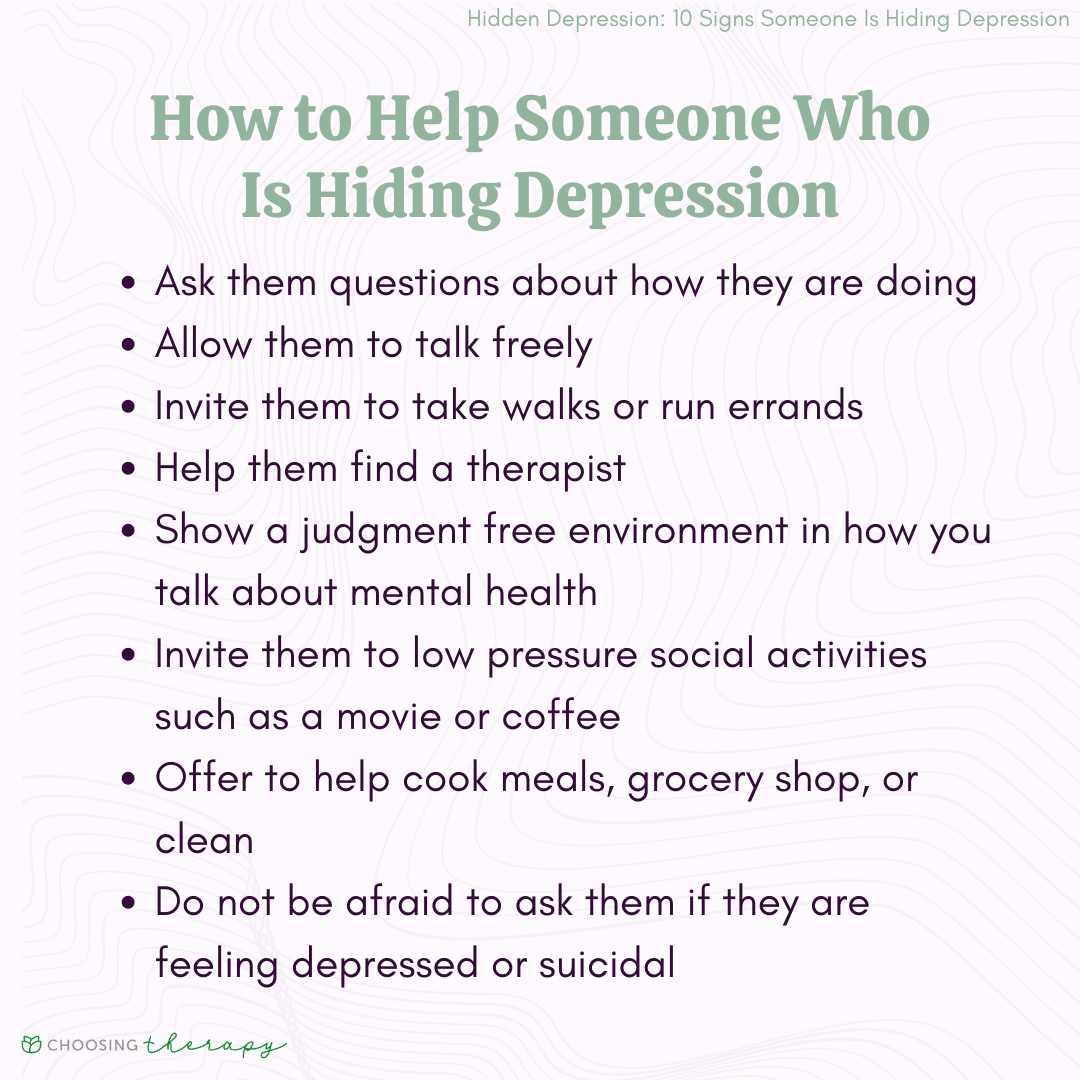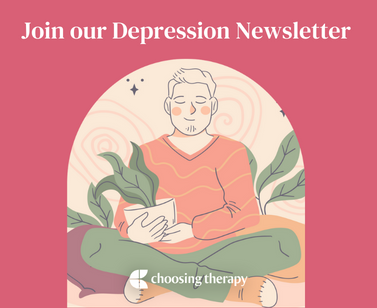When someone is experiencing symptoms of depression, it is not always obvious to others- or even themselves. Many feel like they have to hide their true feelings when in public or around others who do not understand or accept. Dealing with hidden depression is difficult, and there are many reasons why someone would try to hide their depression.
Depression Is Treatable With Therapy
Would you like to feel more happiness and joy? BetterHelp has over 20,000 licensed therapists who provide convenient and affordable online therapy. BetterHelp starts at $65 per week. Take a Free Online Assessment and get matched with the right therapist for you.
What Is Hidden Depression?
Depression is a persistent feeling of sadness, decreased self-esteem, and difficulty completing daily self-care and other tasks. Usually others notice the person’s difficulties and struggles due to their symptoms. Hidden depression is essentially the same thing, but it is not as visible to others. Those who go about their days smiling and engaging with others are often referred to as having hidden, or smiling depression.
Common symptoms of depression include:
- Difficulty completing activities
- Decreased motivation
- Sadness lasting more than two weeks
- Frequent crying
- Lack of self esteem
- Decline in self care
Everyone experiences depression differently, and the symptoms that one person experiences might look different in others. There are also depression symptoms that are harder to recognize as depression.
Lesser known symptoms that could indicate depression include:
- Belief that things just aren’t worth the effort
- Fatigue and lack of energy
- Weight changes or appetite changes
- Decline in sleep quality
- Decreased sex drive
- Poor concentration
- Feelings of hopelessness or worthlessness
- Loss of interest in activities once enjoyed
- Decline in work performance
- Unexplainable aches and pains
People At Increased Risk of Concealing Depression
While anyone can experience hidden depression, some people are more likely to conceal, hide, or have undiagnosed depression than others.
People who are at higher risk of hiding depression include:
- Men
- Children
- Teenagers
- LGBTQ+/Queer community
- People from cultures or backgrounds where depression is more stigmatized
- Those from families where depression is not acknowledged
- Celebrities, politicians, or those in the public eye
Help For Depression
BetterHelp – Get help from a licensed therapist. BetterHelp offers convenient and affordable online therapy starting at $65 per week. Free Assessment
Talkspace – Online Therapy With Or Without Insurance. Talkspace accepts many insurance plans including Optum, Cigna, and Aetna. Typical co-pay is $30, but often less. Get started
What Hiding Depression Looks Like
Although it is impossible to tell just from observation if someone is struggling with symptoms of depression, there are some ways that someone can recognize if their loved one is hiding depression.
One or two changes that take place for a short period of time are not cause for concern, but several changes occurring at the same time over the course of a few weeks could be a sign they might be hiding feelings of depression.
You may notice the following changes in someone who is hiding depression:
Weight Changes
Someone who is struggling with depression may completely change their eating habits. Depression can often cause appetite changes. “Many of the brain regions implicated in appetitive responses to food have also been implicated in depression.”1
Someone who usually has a small appetite may suddenly start eating more and might gain weight. Likewise, someone who is struggling with hidden depression might have a decrease in appetite, and could be observed to have lost weight.
Personality Differences
Someone who is dealing with depression will often have personality changes that are noticed by others. They may suddenly become more quiet and withdrawn when they used to be outgoing and excitable. Or they may seem pessimistic when they used to be much more optimistic.
Asking for Help & Then Taking It Back
Asking for help is a vulnerable act, and can make some people feel uncomfortable. Someone who is dealing with depression is more likely to suffer from a vulnerability hangover – when they ask for help and then feel guilty or awkward and change their mind about needing help.
Increased Health Concerns
Those who have depression are often at increased risk for other health concerns because depression “… predisposes and exacerbates other chronic medical conditions, including diseases related to depression’s vegetative symptoms, such as obesity and diabetes.”1
Decreased Interest in Previously Enjoyed Activities
A major indicator of depression is when someone has decreased interest in activities that they once enjoyed. This might look like someone who looks forward to Friday night bowling for years suddenly dropping off the league, or someone who enjoys exercising suddenly stops jogging.
Speaking Less About Future and Goals
Loved ones may notice that the person is speaking less and less about things that they used to look forward to such as career changes and advancements. Someone who was looking forward to going back to school or opening their own business, for example, may suddenly stop talking about this or start thinking that it’s unattainable or unrealistic.
Seeming Hopeless
Someone with hidden depression may seem more hopeless in their behaviors and speech. In a 2014 study, participants with depression spoke in ways that were more pessimistic and showed less hope for the future when giving responses.2
Some people might send the message about not caring about the future by mentioning a desire to disappear, giving away cherished belongings, canceling future plans, etc.
They Seem More Lethargic or Tired Than Usual
Depression can often contribute to feelings of lethargy and tiredness. Many people struggling with depression often feel like they need to sleep more, or have a desire to just stay in bed.
Using Substances More
Watch for behaviors that seem sudden, or out of character. If someone who never drinks is suddenly enjoying a couple glasses of wine every night, this might be a clue they are struggling with something. Likewise, someone who normally enjoys a glass or two of wine at night with dinner may suddenly start drinking earlier in the day if they are struggling with depression. The same is true for other substances such as weed, cigarettes, etc, that could easily become self medicating.
Lack of Interest in Sex or Intimacy
The partner of the person struggling with hidden depression is more likely to notice things such as changes in intimacy or a decreased interest in sex. Research has shown that experiencing depression can affect someone’s sexual functioning, with the “more severe the depression, the greater the intensity of problems in sexual functioning, specifically sexual desire and sexual satisfaction.”3
Would you like to be evaluated for depression? Virtual psychiatry for depression. Talkiatry offers personalized care with medication and additional support. They take insurance, too. Get started with our short assessment.
Reasons People Hide Their Depression
There are many reasons why people may try to hide their depression. People who have to perform or present in a positive light as part of their professional role may feel that showing signs of depression could jeopardize their career. Doctors, therapists, politicians, and many other careers might face this.
Another common reason that someone might try to hide their depression is if they experienced negative consequences from people in the past. If someone has had experiences of judgment or ridicule when family, friends, or their social circle learned they were depressed in the past, this could make them more likely to try to hide it.
Some common reasons people try hiding depression include:
- Didn’t realize they were depressed: Symptoms of depression can increase gradually. Due to this, some people don’t realize how much it is affecting them until someone else points it out, or until it starts to affect other areas of their life such as job, relationships, or physical health.
- Lack of trust in healthcare professionals: Due to many clinicians’ discomfort with suicidal thoughts and self harm, many clients are scared to disclose to healthcare workers if they are feeling desire to, or have a history of, self harming behaviors
- Not wanting to be a burden to others: Many with depression worry that their symptoms will overwhelm others, and they worry about becoming a burden to loved ones.
- Feel ashamed or embarrassed: There is a lot of shame involved with mental health conditions due to stereotypes and stigmas. Therefore, many feel like they have to be bigger or stronger than their symptoms.
- Don’t like to take medication: Many of the medications such as SSRIs that help depression symptoms can cause sexual dysfunctions and other unwanted side effects.3
Hidden Depression Risks
There are many reasons to seek support if someone is hiding their depression, including the fact that there are risks associated with someone hiding their depression. These risks include health risks, as well as mental health and failed relationships or job stressors.
Untreated depression can increase the risk of:
- Cardiovascular disease
- Substance use to self medicate
- High blood pressure
- Suicide
- Diabetes
- Alzheimer’s disease
- Failed relationships
- Losing a job
Depression Is Treatable With Therapy
Would you like to feel more happiness and joy? BetterHelp has over 20,000 licensed therapists who provide convenient and affordable online therapy. BetterHelp starts at $65 per week. Take a Free Online Assessment and get matched with the right therapist for you.
How to Help Someone Who Is Hiding Depression
There are things you can do if you suspect someone you care about is hiding their depression. While you can’t force someone else to get depression treatment or to take medication, showing support and providing a judgment free environment can make them more likely to seek support on their own. Here are some things you can say to someone with depression.
Family and friends are in a unique position to support people who are suffering with depression. Due to this, many mental health professionals recommend couples or family therapy. “Families and friends can be important advocates to help loved ones get through those hard, early stages of having a mental illness.”4
Options for providing support include:
- Asking them questions about how they are doing to show you care
- Allow them to talk freely if they say they would like to talk about anything
- Invite them to take walks with you or run errands
- Help them find the right therapist using an online therapist directory
- Show a judgment free environment in how you talk about mental health in general
- Suggest accompanying them to low pressure social activities such as a movie or coffee
- Do not say things such as “just think positive,” “try to smile,” or “just pray about it” as these can seem dismissive
- Offer to help them cook meals, grocery shop, or clean
- Do not be afraid to ask them if they are feeling depressed or suicidal
When to Call For Help
There are signs that indicate you or your loved one needs help, such as mentioning thoughts of suicide, engaging in increased or different acts of self-harm, or acting in dangerous behaviors. If you or someone you love is experiencing thoughts of suicide, call the local emergency crisis number or go to a local hospital or emergency room.
In My Experience
In my experience, many clients are scared to tell their therapist that they are experiencing depression symptoms due to the stigma around suicidality and self harm. Fears of being hospitalized keep many from getting the support they need. Due to this, I recommend that someone find a therapist who specializes in depression due to the unique nature of how these symptoms and experiences present.
Additional Resources
To help our readers take the next step in their mental health journey, Choosing Therapy has partnered with leaders in mental health and wellness. Choosing Therapy is compensated for marketing by the companies included below.
Talk Therapy
Online-Therapy.com – Get support and guidance from a licensed therapist. Online-Therapy.com provides 45 minute weekly video sessions and unlimited text messaging with your therapist for only $64/week. Get Started
Online Psychiatry
Hims / Hers If you’re living with anxiety or depression, finding the right medication match may make all the difference. Connect with a licensed healthcare provider in just 12 – 48 hours. Explore FDA-approved treatment options and get free shipping, if prescribed. No insurance required. Get Started
Depression Newsletter
A free newsletter from Choosing Therapy for those impacted by depression. Get helpful tips and the latest information. Sign Up
Learn Anti-Stress & Relaxation Techniques
Mindfulness.com – Change your life by practicing mindfulness. In a few minutes a day, you can start developing mindfulness and meditation skills. Free Trial
Choosing Therapy Directory
You can search for therapists by specialty, experience, insurance, or price, and location. Find a therapist today.
For Further Reading
Online Depression Test A few questions from Talkiatry can help you understand your symptoms and give you a recommendation for what to do next. Best Online Psychiatry Services Online psychiatry, sometimes called telepsychiatry, platforms offer medication management by phone, video, or secure messaging for a variety of mental health conditions. In some cases, online psychiatry may be more affordable than seeing an in-person provider. Mental health treatment has expanded to include many online psychiatry and therapy services. With so many choices, it can feel overwhelming to find the one that is right for you.